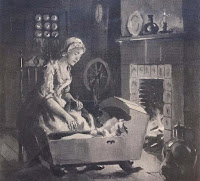We know we are descended from Mayflower passenger Richard Warren, we are somehow descended from the first European woman in New York, some of our West family think our Massachusetts Wests are the same Wests who founded Virginia (not likely), so could we also be descended from survivors of the Lost Colony of Roanoke? Could we have had ancestors at the foundings of most of the North American colonies?
Artist interpretations of: Englishmen finding the carving on the tree; Westover Plantation, Virginia;One of Americans' biggest unsolved mysteries is that of the Lost Colony of Roanoke.
In the 1500s, there was a lot more activity off the southeast coast of North America than we generally think of. The English were making landings and meeting the local Indians. But the ships couldn't land in the shallow waters off of present-day North Carolina, so the first European to make landing, a sailor from Giovanni da Verrazano's ship, had to swim in.
He almost drowned, so the Indians dried him off, warmed him up, and fed him, while the terrified Englishmen on the ship were sure their comrade was about to be eaten by cannibals who planned to roast him over the bonfire they had made.
The Indians had two ways of dealing with strangers: make them family, or make them enemies. The pitiful English, who couldn't land a boat, swim, get food, or bathe or dress properly, certainly weren't a threat, and they had cool stuff to trade, so the Indians made them their kin. They got along so well that two of them, Wanchese and Manteo, decided to visit England to get to know the strangers' country. One purpose was to learn more about writing in order to make an Algonquian alphabet, enabling their people to use a written language.
After 6 months, Wanchese and Manteo returned with another English fleet. The fact that half of them, 300, were soldiers, probably foretold the result. Two years and another fleet later, this time carrying women and children, Indian-English relations were marked by warfare and betrayal.
Capt. John White set sail for England to get more supplies. With maps being so inaccurate and travel across the vast ocean so uncertain, everyone knew they may never see an English ship for a long while, so they came up with a plan. If the passengers left the island, they would leave a message carved into a tree trunk. If they left in distress, they would carve a cross above the message.
Capt. White ran into so many difficulties, he didn't return to the island for 3 years. When he finally returned, he saw no sign of the colony except the message carved into a tree - CROATOAN. There was no distress cross.
Neither John White, nor anyone else, has ever found out what happened to the passengers, not where they went, or if they lived or died. The best guess, based on the message, is that they went willingly to live with the Croatoan Indians.
But who are they?
In 1855, a politician who wanted to make the local North Carolina Indians more white, posited that they were the descendants of the lost Roanoke colonists. His evidence was that when the Indians were encountered by whites in the 1730s, they spoke English and lived in English-style houses. Even more telling was that many of their surnames -- Brooks, Berry, Jones -- were the same surnames as those of the lost colonists.
This theory still persists and it may be true. The Lumbee Indians of North Carolina were called Croatan for many years. The Croatan Archaeological Society believes that the lost colonists went to live with the Hatteras Indians on Hatteras Island. The Lumbees are actually the descendants of many tribes that joined together in colonial times -- among them the Hatteras.
But all those clues can easily be explained away. When the tribes combined, the only language they all understood was English, so they used that. The Lumbee intermarried with Englishpeople and Africans for centuries. The surnames of Brooks, Berry, Jones, etc. are common English names, and could easily have arrived that way.
Our ancestral name, Oxendine, is ubiquitous among the Lumbee Indians. But it is not one of the lost colony surnames. The first Oxendine family went to live with the Indians around 1710 to 1730. But we don't have an unbroken line from our ancestor Catherine Oxendine to the first family, so as yet we don't know.
What do you think?
References:
Lowery, Malinda Maynor. The Lumbee Indians, An American Struggle, University of North Carolina Press, 2018.
https://medium.com/frame-of-reference/are-members-of-this-indian-tribe-descendants-of-the-lost-roanoke-colony-dae4cfc216ba
https://ncseagrant.ncsu.edu/coastwatch/previous-issues/2019-2/spring-2019/wingina-wanchese-and-manteo-a-lumbee-perspective-on-the-lost-colony/
see post - So You Want to be a Mayflower Descendant part 2
see post - Descended from Kings?




Comments
Post a Comment